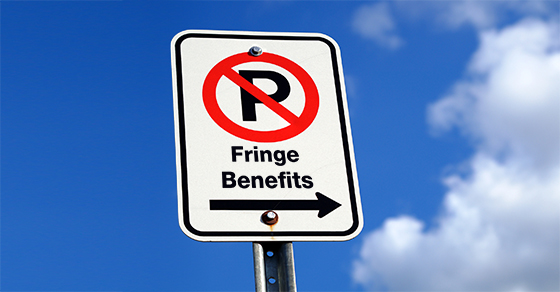The pandemic brought many changes with it, and one that seems to be lasting for many is the option for employees to work from home. This change comes with its own new challenges and questions. One of which relates to fringe benefits provided to employees, specifically if a fringe benefit was offered for parking that is no longer needed.

For example, in IRS Information Letter 2022-0002, the tax agency recently answered an inquiry involving a qualified transportation plan participant whose employer now lets him work from home permanently. To avoid losing dollars he’d previously set aside for parking, the participant asked whether he could transfer unused compensation reductions to his health Flexible Spending Account (FSA), which his employer offered through its qualified cafeteria plan.
No cash refunds
The letter explains that, under an employer’s qualified transportation plan, unused compensation reduction amounts can be carried over to subsequent plan periods and used for future commuting expenses. Caveat: employees can’t receive benefits that exceed the maximum excludable amount in any month.
However, cash refunds aren’t permitted — even to employees whose compensation reduction amounts exceed their need for qualified transportation fringe benefits. Furthermore, the U.S. Code prohibits cafeteria plans from offering qualified transportation fringe benefits. And IRS rules don’t allow unused compensation reduction amounts under a qualified transportation plan to be transferred to a health FSA offered though a cafeteria plan.
The letter also notes that COVID-19-related relief for FSAs gives employers the discretion to amend their cafeteria plans to permit midyear health FSA election changes for plan years ending in 2021.
Note: IRS Information Letters provide general statements of well-defined law without applying them to a specific set of facts. They’re provided by the IRS in response to requests for general information by taxpayers or members of Congress.
Limited flexibility
The qualified transportation rules for fringe benefits have largely proven themselves flexible enough to handle most situations arising from the pandemic.
Many companies permit benefit election changes at least monthly, and plans can allow current participants to carry over unused balances indefinitely. Compensation reductions set aside for one qualified transportation benefit, such as parking, can even be used for a different transportation benefit, such as public transit — again, so long as the plan permits it, and the maximum monthly benefit isn’t exceeded.
However, as the inquisitive participant in the IRS information letter learned, the flexibility of fringe benefit rules has its limits. Because some financial loss could occur due to changing circumstances, businesses should clearly articulate this risk to employees when offering compensation reduction elections.
Complexities to consider
The right fringe benefits can help your business attract and retain good employees. But, as you can see, there are many complexities to consider. For help considering which fringe benefits to offer and weighing the pros and cons of potential benefits, please contact your Rudler, PSC advisor at 859-331-1717.
RUDLER, PSC CPAs and Business Advisors
This week's Rudler Review is presented by Becca Thorman, CPA, CVA and John Wood CPA, CVA.
If you would like to discuss your particular situation, contact Becca or John at 859-331-1717.


As part of Rudler, PSC's commitment to true proactive client partnerships, we have encouraged our professionals to specialize in their areas of interest, providing clients with specialized knowledge and strategic relationships. Be sure to receive future Rudler Reviews for advice from our experts, sign up today !